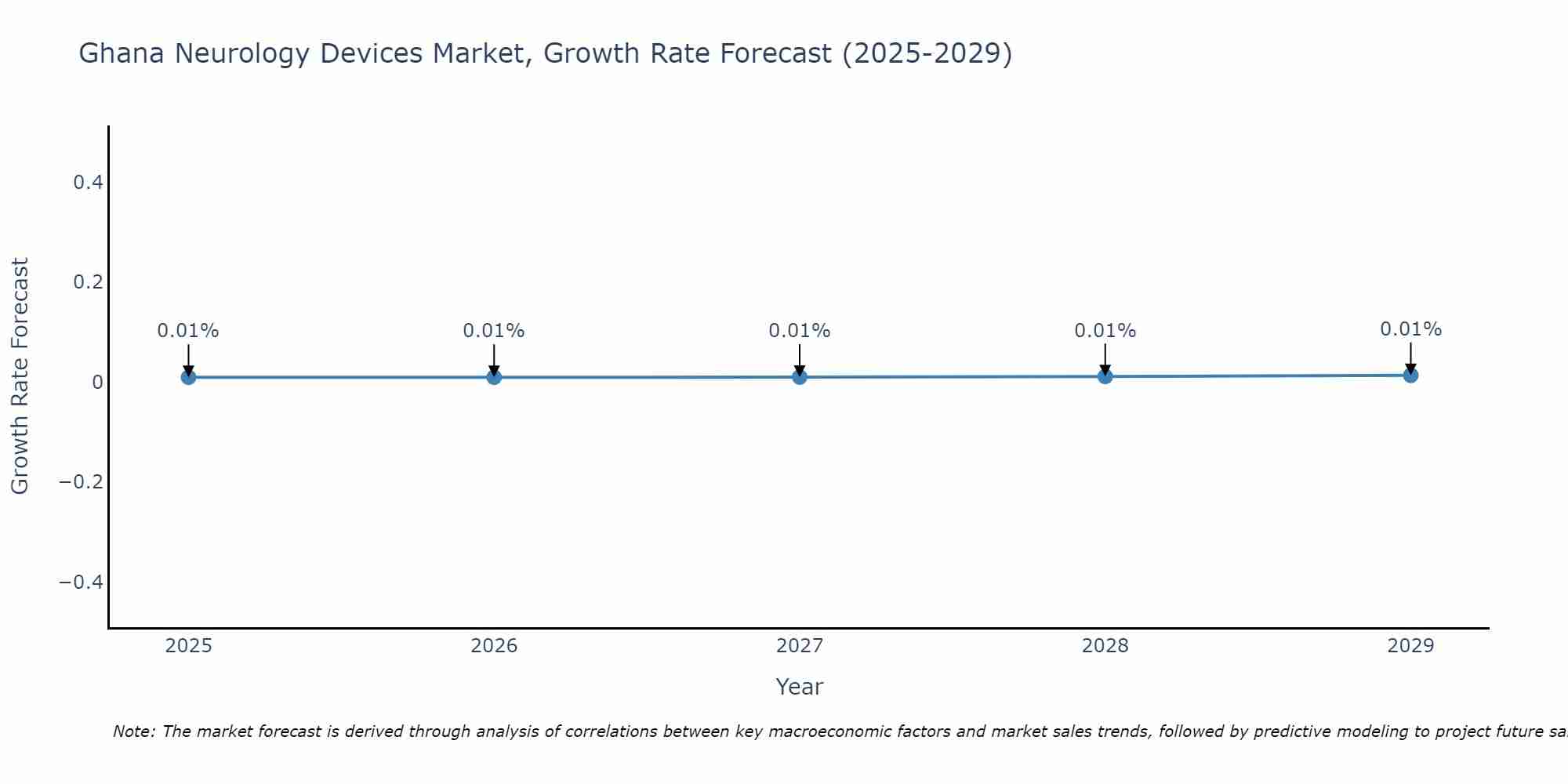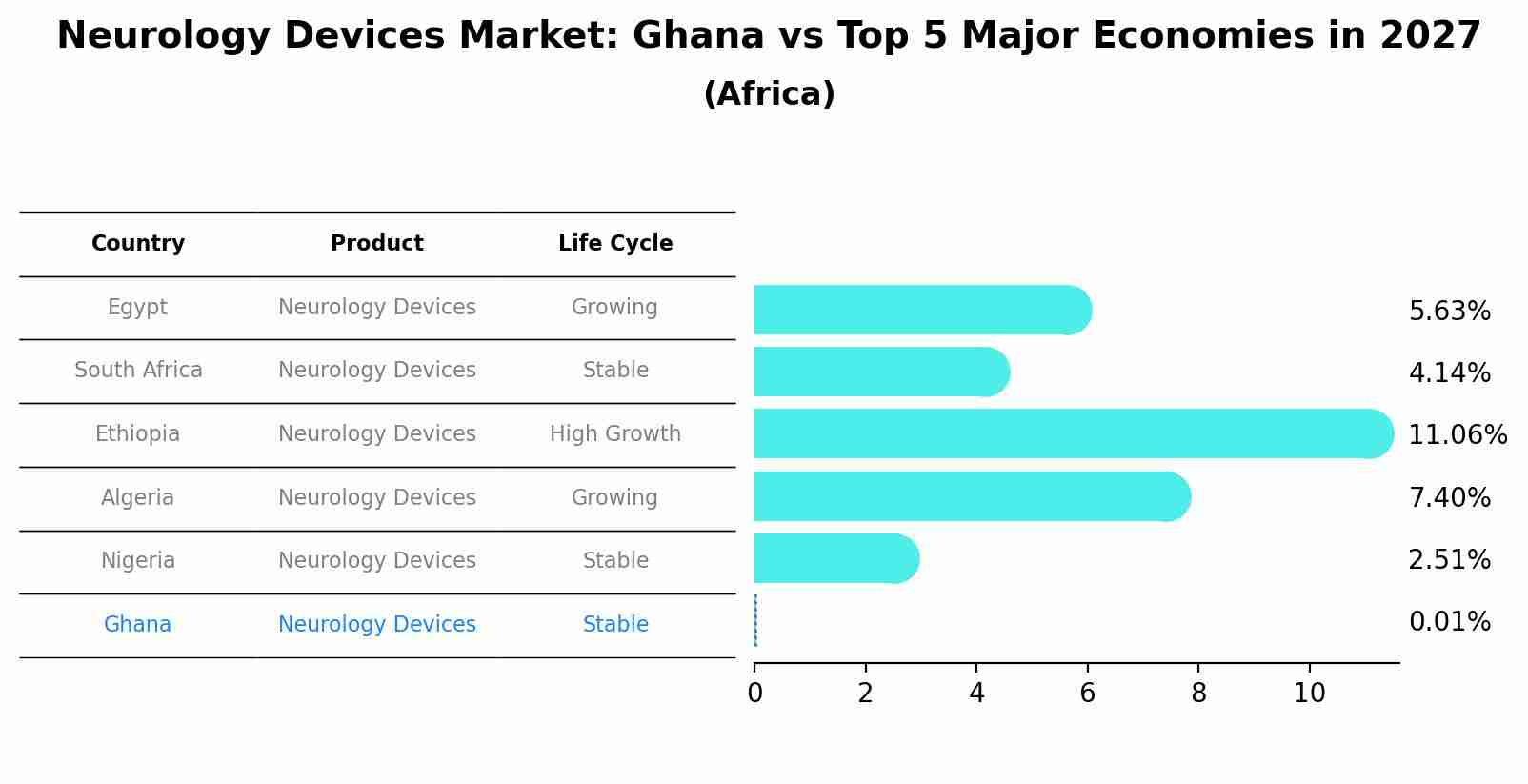Ghana Neurology Devices Market (2025-2031) Outlook | Companies, Analysis, Industry, Size, Value, Share, Forecast, Growth, Revenue & Trends
| Product Code: ETC367676 | Publication Date: Aug 2022 | Updated Date: Apr 2025 | Product Type: Market Research Report | |
| Publisher: 6Wresearch | Author: Shubham Padhi | No. of Pages: 75 | No. of Figures: 35 | No. of Tables: 20 |
Ghana Neurology Devices Market Size Growth Rate
The Ghana Neurology Devices Market is likely to experience consistent growth rate gains over the period 2025 to 2029. Commencing at 0.01% in 2025, growth builds up to 0.01% by 2029.

Neurology Devices Market: Ghana vs Top 5 Major Economies in 2027 (Africa)
The Neurology Devices market in Ghana is projected to grow at a stable growth rate of 0.01% by 2027, highlighting the country's increasing focus on advanced technologies within the Africa region, where Egypt holds the dominant position, followed closely by South Africa, Ethiopia, Algeria and Nigeria, shaping overall regional demand.

Ghana Neurology Devices Market Overview
The neurology devices market in Ghana is witnessing growth, driven by factors such as the increasing prevalence of neurological disorders and the adoption of advanced medical technologies in the healthcare sector.
Drivers of the market
The Ghana neurology devices market experiences growth driven by the increasing prevalence of neurological disorders and the need for advanced diagnostic and therapeutic solutions. With the aging population and the rising awareness about neurological conditions, healthcare providers invest in neurology devices such as imaging systems, neurostimulation devices, and neuromodulation implants to improve patient outcomes and quality of life. Factors such as technological advancements, regulatory approvals, and healthcare infrastructure development contribute to the expansion of the neurology devices market in Ghana.
Challenges of the market
Limited access to advanced neurology devices and the high cost of medical equipment pose challenges in the neurology devices market. Additionally, regulatory constraints and reimbursement policies impact market dynamics.
Government Policy of the market
Recognizing the importance of medical technology innovation in improving healthcare outcomes and quality of life, the government has prioritized policies to support the growth of the neurology devices market. Measures include promoting regulations and standards for device safety, efficacy, and quality assurance, ensuring compliance with medical device registration and licensing requirements. By fostering partnerships between medical device manufacturers, healthcare providers, and regulatory authorities, the government aims to enhance access to affordable, high-quality neurology devices for diagnosis, treatment, and rehabilitation of neurological disorders in Ghana.
Key Highlights of the Report:
- Ghana Neurology Devices Market Outlook
- Market Size of Ghana Neurology Devices Market, 2024
- Forecast of Ghana Neurology Devices Market, 2031
- Historical Data and Forecast of Ghana Neurology Devices Revenues & Volume for the Period 2021-2031
- Ghana Neurology Devices Market Trend Evolution
- Ghana Neurology Devices Market Drivers and Challenges
- Ghana Neurology Devices Price Trends
- Ghana Neurology Devices Porter's Five Forces
- Ghana Neurology Devices Industry Life Cycle
- Historical Data and Forecast of Ghana Neurology Devices Market Revenues & Volume By Product for the Period 2021-2031
- Historical Data and Forecast of Ghana Neurology Devices Market Revenues & Volume By Neurostimulation Devices for the Period 2021-2031
- Historical Data and Forecast of Ghana Neurology Devices Market Revenues & Volume By Neurosurgery Devices for the Period 2021-2031
- Historical Data and Forecast of Ghana Neurology Devices Market Revenues & Volume By Interventional Neurology Devices for the Period 2021-2031
- Historical Data and Forecast of Ghana Neurology Devices Market Revenues & Volume By Cerebrospinal fluid management devices for the Period 2021-2031
- Historical Data and Forecast of Ghana Neurology Devices Market Revenues & Volume By Others for the Period 2021-2031
- Historical Data and Forecast of Ghana Neurology Devices Market Revenues & Volume By End User for the Period 2021-2031
- Historical Data and Forecast of Ghana Neurology Devices Market Revenues & Volume By Hospitals for the Period 2021-2031
- Historical Data and Forecast of Ghana Neurology Devices Market Revenues & Volume By Ambulatory surgery centers for the Period 2021-2031
- Historical Data and Forecast of Ghana Neurology Devices Market Revenues & Volume By Neurology clinics for the Period 2021-2031
- Ghana Neurology Devices Import Export Trade Statistics
- Market Opportunity Assessment By Product
- Market Opportunity Assessment By End User
- Ghana Neurology Devices Top Companies Market Share
- Ghana Neurology Devices Competitive Benchmarking By Technical and Operational Parameters
- Ghana Neurology Devices Company Profiles
- Ghana Neurology Devices Key Strategic Recommendations
Frequently Asked Questions About the Market Study (FAQs):
- Single User License$ 1,995
- Department License$ 2,400
- Site License$ 3,120
- Global License$ 3,795
Search
Related Reports
- Saudi Arabia Manlift Market (2025-2031) | Outlook, Size, Growth, Trends, Companies, Industry, Revenue, Value, Share, Forecast & Analysis
- Uganda Excavator, Crane, and Wheel Loaders Market (2025-2031) | Strategy, Consumer Insights, Analysis, Investment Trends, Opportunities, Growth, Size, Share, Industry, Revenue, Segments, Value, Segmentation, Supply, Forecast, Restraints, Outlook, Competition, Drivers, Trends, Demand, Pricing Analysis, Competitive, Strategic Insights, Companies, Challenges
- Rwanda Excavator, Crane, and Wheel Loaders Market (2025-2031) | Strategy, Consumer Insights, Analysis, Investment Trends, Opportunities, Growth, Size, Share, Industry, Revenue, Segments, Value, Segmentation, Supply, Forecast, Restraints, Outlook, Competition, Drivers, Trends, Demand, Pricing Analysis, Competitive, Strategic Insights, Companies, Challenges
- Kenya Excavator, Crane, and Wheel Loaders Market (2025-2031) | Strategy, Consumer Insights, Analysis, Investment Trends, Opportunities, Growth, Size, Share, Industry, Revenue, Segments, Value, Segmentation, Supply, Forecast, Restraints, Outlook, Competition, Drivers, Trends, Demand, Pricing Analysis, Competitive, Strategic Insights, Companies, Challenges
- Angola Excavator, Crane, and Wheel Loaders Market (2025-2031) | Strategy, Consumer Insights, Analysis, Investment Trends, Opportunities, Growth, Size, Share, Industry, Revenue, Segments, Value, Segmentation, Supply, Forecast, Restraints, Outlook, Competition, Drivers, Trends, Demand, Pricing Analysis, Competitive, Strategic Insights, Companies, Challenges
- Israel Intelligent Transport System Market (2025-2031) | Strategy, Consumer Insights, Analysis, Investment Trends, Opportunities, Growth, Size, Share, Industry, Revenue, Segments, Value, Segmentation, Supply, Forecast, Restraints, Outlook, Competition, Drivers, Trends, Demand, Pricing Analysis, Competitive, Strategic Insights, Companies, Challenges
- Uganda Precast and Aggregate Market (2025-2031) | Strategy, Consumer Insights, Analysis, Investment Trends, Opportunities, Growth, Size, Share, Industry, Revenue, Segments, Value, Segmentation, Supply, Forecast, Restraints, Outlook, Competition, Drivers, Trends, Demand, Pricing Analysis, Competitive, Strategic Insights, Companies, Challenges
- Australia IT Asset Disposal Market (2025-2031) | Strategy, Consumer Insights, Analysis, Investment Trends, Opportunities, Growth, Size, Share, Industry, Revenue, Segments, Value, Segmentation, Supply, Forecast, Restraints, Outlook, Competition, Drivers, Trends, Demand, Pricing Analysis, Competitive, Strategic Insights, Companies, Challenges
- UAE Building Thermal Insulation Market Outlook (2025-2031) | Revenue, Companies, Share, Trends, Growth, Size, Forecast, Industry, Analysis & Value
- Portugal Electronic Document Management Market (2025-2031) | Strategy, Consumer Insights, Analysis, Investment Trends, Opportunities, Growth, Size, Share, Industry, Revenue, Segments, Value, Segmentation, Supply, Forecast, Restraints, Outlook, Competition, Drivers, Trends, Demand, Pricing Analysis, Competitive, Strategic Insights, Companies, Challenges
Industry Events and Analyst Meet
Our Clients
Whitepaper
- Middle East & Africa Commercial Security Market Click here to view more.
- Middle East & Africa Fire Safety Systems & Equipment Market Click here to view more.
- GCC Drone Market Click here to view more.
- Middle East Lighting Fixture Market Click here to view more.
- GCC Physical & Perimeter Security Market Click here to view more.
6WResearch In News
- Doha a strategic location for EV manufacturing hub: IPA Qatar
- Demand for luxury TVs surging in the GCC, says Samsung
- Empowering Growth: The Thriving Journey of Bangladesh’s Cable Industry
- Demand for luxury TVs surging in the GCC, says Samsung
- Video call with a traditional healer? Once unthinkable, it’s now common in South Africa
- Intelligent Buildings To Smooth GCC’s Path To Net Zero













